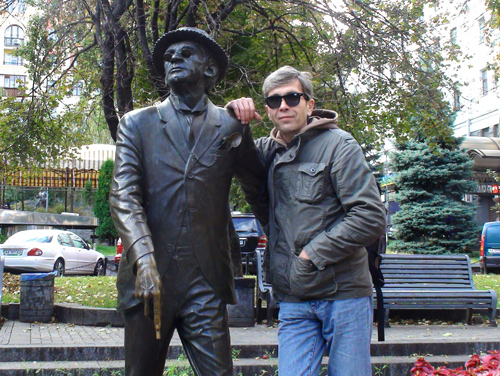“A friend of mine was refused entry into the United States because he has diabetes and needs a daily injection of insulin.” Anybody who hears this statement will almost certainly think it insane.
“A friend of mine was refused entry into the United States because he is drug-dependent and needs a daily injection of heroin.” Why should this sound any less crazy?
In both cases we’re talking about a medical condition, but our society refuses to see drug dependency as an illness, choosing to focus on its legal and moral aspects instead.
We’re used to double standards. While alcohol has been readily accepted by our society, the 50-year-long war on drugs rages on, its primary targets being drug users and anyone else who has rejected the hardline doctrine that equates drug users with criminals. HIV epidemics thrive in environments where drug users are criminalized.
I live in Ukraine. Ukraine is a great country, but just like many other countries, it has no place for people who, like me, are drug-dependent. In my country:
- One out of every 9 prisoners is behind bars for drug possession
- Every day 60 Ukrainians—most of them people who use drugs—are diagnosed with HIV
- Trace amounts of drug in a used syringe can be grounds for arrest. This has put an end to needle exchange programs in my country, limiting them to mere distribution of clean needles. Both drug users and outreach workers no longer exchange used syringes knowing that doing so can result in jail time
- My medical condition—drug dependency—is grounds for discrimination, not medical care and social assistance
I am confident that had Ukraine approached its drug policy from the place of evidence and reason, not force and repression, we would have fewer people in prisons and fewer people living with HIV. That’s a fact. The experience of other countries, which have shifted their drug policy paradigm away from the “Gulags” and into the realm of public health, speaks for itself.
I’ve been an opiate substitution treatment (OST) patient in Ukraine for the last 4 years. I remember the feeling of calm and happiness when I first started treatment–knowing that I no longer needed to run from the law or spend all of my time and money on drugs. Yet today, with opiate substitution treatment misunderstood and attacked by the government, the police and the society at large, I am no longer as confident about the future of these programs in Ukraine. Nor am I confident about my own future or that of my peers. A new and terrible regulation in Ukraine even goes as far as saying that OST patients like me can be ejected from the program if we jaywalk. It’s a paradox: while OST is a government-endorsed program, that very same government is now making every effort to sabotage it.
The world is full of contradictions. Here’s another one: in July, Washington, D.C. will host a conference on HIV/AIDS, where participants will gather to discuss to the latest science and policy of HIV treatment and prevention. Yet the country’s immigration policy denies entry to those disproportionately affected by the pandemic—people dependent on drugs—because of their medical condition. I would like to be there in Washington, D.C., to remind you that protecting the rights of those affected by HIV is a critically important part of addressing the epidemic. We can’t treat our HIV if we’re constantly singled out and isolated by society, if we’re dying in prisons from tuberculosis and other preventable illnesses, if we’re dying from overdose. We can’t think about tomorrow, if we are pursued by the law and denied quality medical care today.
I am 44 years old. By Ukrainian standards I have lived a long life. Drug users in my country simply don’t live that long; most die before they turn 30. I very much hope that I will live to see the day when drug dependency ceases to be an issue not just for entering into a country, but for receiving quality medical and social care as well.
I wanted to tell you this in person. Unfortunately, being a drug user, I cannot be at the conference this year. My only chance at making my voice heard is to write you this letter.
Igor Kuzmenko lives in Sevastopol, Ukraine. He is a vocal advocate for the rights of opioid substitution treatment (OST) patients in Ukraine. Over the last few years Igor produced a number of short films profiling the lives of OST patients and documenting existing barriers to treatment. Follow the links to learn more about Igor’s work.
Posted by Igor Kuzmenko, 2012-07-10 | Blog, Kiev
